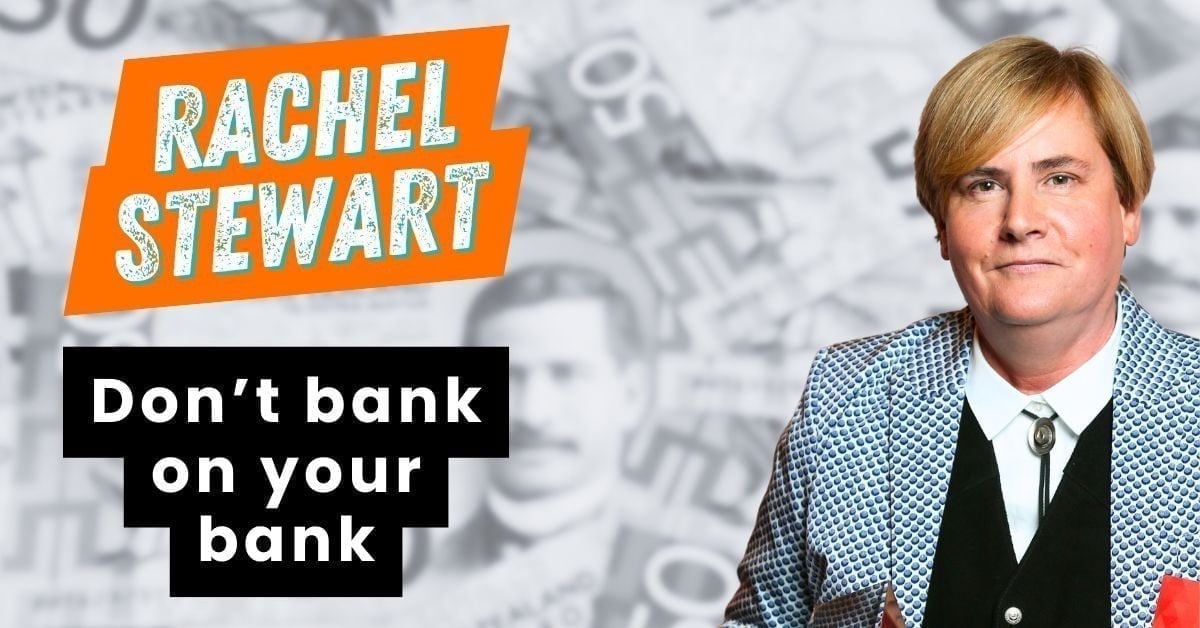
By Rachel Stewart
Apart from wisdom one of the only advantages to aging is that you tend to have more money. And if you are wise, you’ll likely be cautious about having too much dosh stashed away in banks.
I’m no economist but life has taught me a thing or two about their skill at NOT being able to read the financial tea leaves. Only a handful of them actually saw the 2008 Global Financial Crisis coming, so forgive me if I don’t take economists too seriously.
Plus, you know, they tend to shill for the banks, and I have come to distrust banks. These days I don’t have a mortgage, so I try and stay completely away from them, but sometimes you do still have to darken their doors.
Around five years ago I started making sure I had minimal money in their clutches. The interest rates were so dire anyway, so I purchased a classic car, did the house up, travelled. Then, when we sold a property and found we had a largish sum of money in there, we decided to withdraw the cash.
Except, despite giving them due notice, on the day I went to collect it they made such a to-do about it in front of other staff and customers, that I concluded it had become unsafe to take it out of the building.
They wanted to know who our lawyer was, and would he possibly write a letter telling them what it’s going to be used for. They said they were concerned for my safety, you know, having that much cash. As if.
Me being me, I reacted to all of this questioning negatively and left the bank bristling. It was my bloody money!
So, I set about going to various ATMs and withdrawing $3000 per day for weeks. It was my risk and I never regretted that decision.
Around 4 months later I received an email from some random Auckland banking person clumsily stating that the bank had noticed these series of withdrawals, and what was I going to use the cash for and would I be doing it again. Honestly, they were that blunt.
And, again, they professed “concern” for my safety and security by holding that money.
Well, it’s an understatement to say that I thoroughly enjoyed writing my response to that email.
Those transactions were entirely legal, were not subject to any laundering rules, and I asked why it had taken them so long to notice given their “concern” for my safety. They never responded.
In future, I’m simply gonna’ do what this guy does.
Apart from being stymied trying to withdraw your own pingers, there is their love of all things rainbow. How about Kiwibank awarding that odious creature Shaneel Lal ‘Young NZer of the Year’ in 2023 – and straight after he led the mob of trans activists against Posie Parker at Albert Park. Nice guy. Great role model.
I don’t want any bank to do anything other than focus on banking. You?
But the biggest worry is a bank failure. The days of government bailouts are long gone.
Let’s talk about the Reserve Bank’s ‘Open Bank Resolution Policy’. The what?
The ‘Open Bank Resolution’ (OBR) is an extremely important piece of policy that most New Zealanders have never heard of. Trust me, I’ve asked around and they haven’t.
If you have debt it will likely not concern you in the slightest. If you have savings you’ll possibly endure sleepless nights.
It’s not entirely hushed up, but you do need to go looking to find it. First, some context.
At the height of the 2008 Global Financial Crisis (GFC), and fearing a run on the banks, the then Labour government followed Australia’s lead and guaranteed all bank deposits under the Crown’s Retail Deposit Guarantee Scheme.
In 2009, rightly or wrongly, South Canterbury Finance investors were bailed out to the tune of $1.6 billion by the taxpayer.
National was in power by the payout stage and, when the Scheme ended in 2011, they quickly looked for other solutions to future financial failures.
Unlike every other OECD country, National wouldn’t entertain private deposit insurance saying it would increase ‘moral hazard’ and make banks more susceptible to failure.
So, in 2012 they decided to breathe new life into an old idea that the Reserve Bank had been kicking around for a while – the OBR.
They made minimal noise about what they were up to and, of course, the banks (your bank) didn’t tell you about it. They knew exactly what was happening because they had made submissions on the policy.
The mainstream media certainly didn’t seem terribly interested in this new ‘in the unlikely event of a bank failure’ approach.
That is until the weekend in March 2013 that the news of Cyprus broke.
Cypriots were suddenly locked out of their bank accounts and could no longer withdraw any funds. It soon became clear they were getting a “haircut” – another term for being fleeced of some of their savings by a government-directed bailout.
A ‘statutory manager’ decides whether it’s a wee trim, a Mohawk or a No.1, while you’re busy flailing around just trying to get the EFT-POS card to work, or take money out of an ATM.
Don’t worry though because, at the end of all of this powerlessness, you’d eventually be able to access the remainder of your frozen funds. Cypriots lost 47.5 percent of their total savings.
The OBR policy can be found on the Reserve Bank’s website. In great and gruesome detail, you can read all about how a bank bailout would be applied, by whom, what to expect, and why it’s such a jolly good idea. For the banks, of course.
I can already hear you saying that NZ banks are safe as houses and not as exposed as other countries. Ya’ reckon?
Well, look what got dropped yesterday? A presser about just that.
Any misguided expectation that NZ is somehow special and inured to instability because of our size – or some such naivety – needs to be tempered with a decent dose of coffee smelling.
All the more reason to think hard about how exposed you are before the next cab off the rank called the ‘Reserve Bank’s digital currency proposal’ pulls up next to you.
If that works out like the banks want it to there will be no more cash to worry about ever again.
